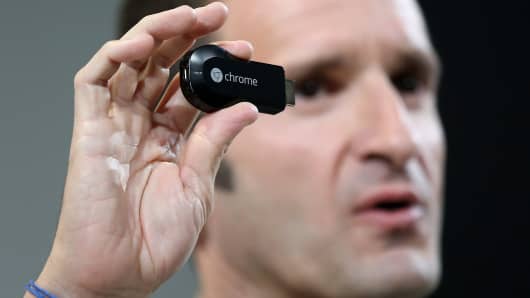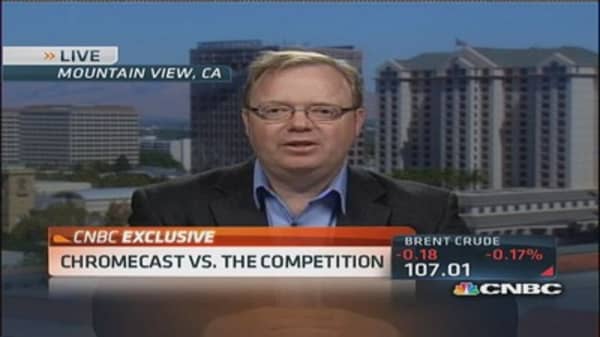The race for the living room just got a little bit more intense.
On Tuesday Google unveiled its Chromecast device, a dongle that promises to make streaming Internet video to your TV a cinch. And at about 35 bucks a pop, it's significantly cheaper than the Apple TV with its AirPlay feature, which prices at about $100.
(Read more: Google gets deeper into hardware with new tablet, TV gadget)
But just because it's cheaper doesn't mean it's going to be a threat to Apple—at least not right away, analysts say.
"It doesn't make Apple suddenly shake in their boots," said James McQuivey, a principal analyst at the Forrester research firm. "If you are someone who has iPad, an iPhone or an Apple laptop, this isn't something you are going to buy. But there are hundreds of millions of people who don't, so it's a way to get people to try Google's platform and to get people who are already using the platform to like it even more."
Chromecast plugs into a television's HDMI port to connect to the Wi-Fi network. The user can then stream content from a phone, tablet or computer and watch it on a larger screen.
Unlike Apple TV, the Chromecast can be used with Android devices as well as iOS devices as long as they are accessing the streaming device via a Google platform, like the Chrome browser. Chromecast still doesn't support every service, but does support some of the key ones including YouTube, Netflix and Pandora.
"It's almost like Google said 'let's go cheaper and make it easier and make it potentially more expansive,' so that you don't have to have an Android phone or tablet to do it," McQuivey said. "Suddenly Google's ecosystem comes to benefit them in a big way. It was a smart move on their part and a recognition on their part that every attempt they have made at TV has failed."





